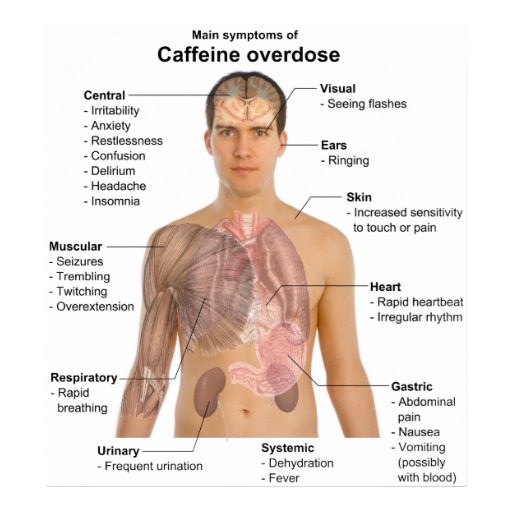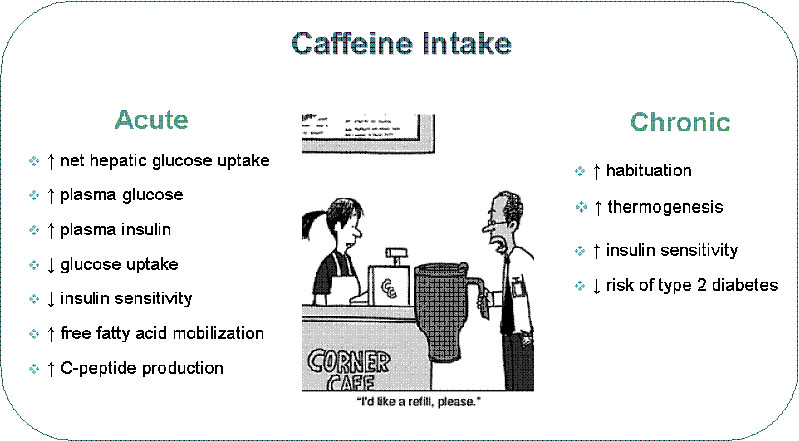Coffee is one of the most popular drinks in the world together with beer and water. About 83 percent of the US population drinks coffee and the number is steadily growing each year. Coffee is not anymore served in black or with plain cream and sugar. Today, it comes in all sorts of tastes and style – from brewed, frappuccino, and decaffeinated. Drinking coffee is a customary act in all kinds of occasions and it is one of the favorite past times of people around the world. It is present at workplaces, homes, and even during vacation holidays. While many people enjoy the coffee leisure, only a fraction is well knowledgeable about the risks and dangers of taking too much caffeine. Remember, caffeine is not deadly by nature but it can trigger risk factors causing serious health conditions. Below are some of the negative effects that excessive caffeine intake may bring.
10. Cardiovascular problems.

Caffeine intake, regardless of the amount, increases heart rate and elevates blood pressure level. In a worst-case scenario, it can trigger a heart attack. Caffeine along does not cause hypertensive attacks but it can be a factor affecting strokes and coronary vasospasms. People with a family lineage of heart diseases should refrain from drinking coffee especially when they reach 35 years of age.
9. Stress.

Surprisingly, coffee does not help you deal with stress effectively. In fact, caffeine intake increases the production of stress hormones called Cortisol. When the body produces too much of these negative adrenal hormones, it causes irritability, muscular fatigue, anxiety, insomnia, and indigestion among many other things leading to sickness. People normally drink coffee to keep the adrenaline at an optimum level and help them stay awake. In reality, it only alters the body clock which is detrimental to one’s health.
8. Emotional disturbances.
Contrary to popular beliefs, coffee does not necessarily increase a person’s energy level. Caffeine is a natural downer and though some people may feel invigorated upon drinking coffee, the long-term effects are disturbing. Depression occurs when the effect of caffeine wears out and the body needs to have the next dose just to feel and function “normally”. This is when the concept of coffee addiction comes in.
7. Blood sugar and insulin problems.

People with diabetes and other insulin-related problems tend to say that decaffeinated coffee should do the trick in order for them to keep a balanced blood sugar level. This is an issue of mental conditioning because in reality, caffeine intake causes the overproduction of insulin in just a matter of few hours. People with weight problems should refrain from drinking coffee because the body’s biological language allows excess sugar to be stored as fat. It also makes you crave for carbohydrate and glucose-rich food. This is the same case with sodas and other beverages, so unless you will completely strain yourselves from these temptations, you will still experience insulin challenges at one point in your life.
6. Gastrointestinal problems.

Drinking coffee with an empty stomach can really be hazardous to health, and this is a scientific fact that is oftentimes ignored by many. Caffeine intake, regardless of the amount per instance, increases the production of hydrochloric acid (HCI). In normal body conditions, HCI is ideally produced to facilitate digestion. When the body reaches its height of HCI production, it will have difficulty producing enough amount to deal with a larger meal. This causes indigestion, diverticulitis, and in worse cases, colon cancer. This is the reason why people experience that burning sensation after they drink coffee. Hyperacidity can also lead to heartburn and gastro-esophageal reflux also known as “acid reflux”. Ulcer is not caused by caffeine but rather caused by the Helicobacter pylori bacteria, but increased intake of coffee can worsen the thinning of the stomach. This is the same case with patients with spasms, gastritis, and Crohn’s disease. People diagnosed with hyperacidity or ulcers are advised to avoid caffeine intake regardless of the amount.
5. Nutritional deficiencies.

Caffeine intake, not just coffee, causes serious nutritional deficiencies leading to osteoporosis. Caffeine inhibits the absorption of important nutrients in the body responsible for growth such as calcium, magnesium, potassium, iron, and other minerals.
4. Male reproductive health problems.

Caffeine is a natural diuretic substance and it causes the inflammation of the prostate gland, which then lead to urinary problems. Reduce your caffeine intake if you are experience sleeping troubles just because you have to get up several times just to pee.
3. Female reproductive health problems.

Drinking coffee has a profound effect for females, more than the normal perception. Health conditions such as PMS, osteoporosis, miscarriage, infertility problems, and fibrocystic breast problems are all exacerbated by caffeine intake. The ultimate culprit is the massive loss of magnesium and calcium that are important elements for lactating and pregnant women.
2. Adrenal exhaustion.

People tend to drink lots of coffee to keep them awake and accomplish more tasks. Ironically, caffeine makes the body weaker and more vulnerable to immune diseases. These include inflammation of the muscles, autoimmunity where the antibodies are not functioning well against bad bacteria, colds, flue, and over fatigue. During stressful and physically-demanding activities, the body naturally excretes adrenaline and other anti-aging hormones to cope up with the environmental condition. But with coffee intake, caffeine automatically replaces these good hormones which is similar to a car running on an empty gas tank. As a result, you will most likely feel irritability, drowsiness, anger, and additional pressure. It is just making everything worse contrary to what you are expected to believe.
1. Accelerated aging.

Have you ever wondered why some people look older than their actual age? If you look closely to their diet plan, you should be able to notice a common denominator – coffee or any other caffeine-related products. Caffeine dehydrates the body. It takes out body water needed to replenish skin and melatonin, which is responsible for giving you a healthy glow. It drains cells particularly in the kidneys, giving you a hard time flushing toxins out of the body.

